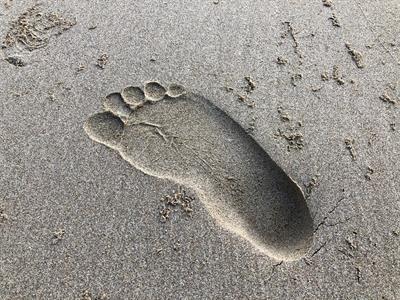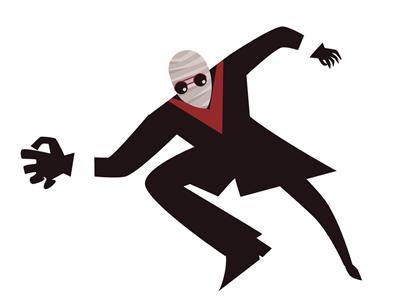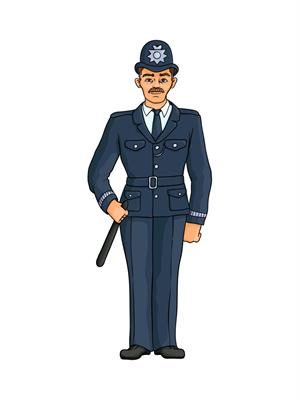PDF chapter test TRY NOW
The story opens with the narrator stating that two boys started wondering after seeing the fresh muddy impressions of bare feet. On seeing that, they questioned each other as to what the barefoot man was doing on the stairs of a house in the middle of London. They began to wonder about the man, who was nowhere to be seen.
While the two boys were walking and looking down, they found an unbelievable sight. It was nothing but a fresh footprint. Even though there was a footmark, the boys couldn't see to whom the footmark belonged. The two boys then noticed several footprints. The imprints continued one after one down the steps and proceeded to the street. Even though the boys could see the imprints of a barefooted man, the man was still invisible to them. The boys thought the footprint belonged to a man because it might seem big. (One can assume that while comparing the female's feet, the man's feet would be bigger). The two boys then followed the invisible man's footsteps in excitement. They followed it until the footprints vanished.

Muddy footprint
The narrator then introduced the scientist Griffin to his readers. The scientist had worked for a long time and tested many experiments to see how to make the human body invisible. To know whether his discovery would become successful, he consumed certain rare drugs one day. As a result of consuming the rare drugs, the scientist became invisible as he expected. He became transparent like a sheet of glass. In addition, he says that the scientist seemed to be as solid as glass. It means that he had a definite shape and size but was invisible to others.


Finally, the scientist became a homeless man. He wandered without money and clothes. Also, the main thing was that he wandered invisibly. His presence was only felt after he stepped in some mud, and his footprints could be seen as he walked.
When the scientist entered the store, it was time to close the shop. The store's doors were shut, and nobody was inside the shop. He felt the pleasure of wearing new clothes without paying for them. He broke the boxes open using force. Then he tore the wrappers from the box and dressed in warm clothing. He became visible again as he wore shoes, an overcoat and a hat. From here, one can understand that the scientist becomes visible when he dresses up or covers anything over him. If he is in his bare body, he won't be visible to anyone.
Later, the scientist found some cold meat and coffee in the kitchen of the London store. After consuming that, he followed up the meals with sweets and wine from the grocery store. After finishing his big dinner, he finally settled down to sleep on a pile of quilts.
Usually, everyone knew that if someone stole something and stayed in that place, the shop owner or assistants would beat them or surrender them to the police. The same thing happened to the scientist. He didn't wake up until the assistants were on their way the next morning.
When the scientist saw a couple of men approaching him, he panicked and started to run. He had no other go, so he ran from there. Usually, the assistants would chase him if someone stole things from the shop and ran without paying. It happend here, too; the assistants chased him as the scientist started running.
In the end, the scientist could escape from the assistants only by rapidly removing his freshly acquired clothing. Later, he became invisible again and roamed naked in the chill January air.


The scientist then arrived at the inn in Iping. The event of a stranger coming and staying at the inn on a winter night was not normal in Iping. It might be because people used to visit Iping during the summer season. But when people came to know about a stranger who visited Iping during winter, it appeared to be weird. The narrator then says they all set their tongues wagging while seeing the scientist's strange appearance. Here the term "tongues are wagging" means talking a lot about something. Here all the people around the Iping were talking a lot about the stranger and his appearance.
The narrator then says that the landlord's wife (the inn where the scientist was staying), Mrs Hall tried to be close to the scientist. She might have made every effort to be friendly because she has to make her guest more comfortable as he is the inn's visitor. Also, it might be because the lady wished to know everything about him while becoming close to the scientist.
But the scientist did not like to talk to her. He told her that his reason for coming to Iping was for peace and quietness, and he did not like to be disturbed in his work. Also, he told her that an accident had affected his face, due to which he had to cover it.
The landlord's wife, Mrs Hall, then accepted that her new guest was a strange scientist and was ready to excuse his temper and habits as he had paid her in advance. The money he had stolen from the previous shop did not last long, and he had no ready cash available for further payment at the inn. As a result, to avoid being caught, he pretended to be waiting for a cheque that would arrive.

Cheque
Then shortly, a strange incident occurred. Noises in the room awoke a clergyman and his wife quite early in the morning. They could hear money being stolen from his desk as they headed downstairs. The clergyman threw open the door silently, holding a metal rod in his hand. He said "surrender" as soon as he opened the door, believing he had caught the robber.
To their surprise, the clergyman and his wife couldn't see anyone. The room appeared to be vacant. The clergyman and his wife looked under the desk. Then they looked behind the curtains and also up the chimney. But there was no sign of anyone standing in the room. They realised that the desk had been opened and the housekeeping money (the money used to buy food and other things necessary for living in a house) was gone.
After seeing the strange incident and the situation, the clergyman said, "Extraordinary affair". Here the term "extraordinary affair" means that something weird was happening around them. He used the phrase to describe what happened in his room. The money had been stolen, and no one could be found in the room. He continued to say such throughout the day since he was horrified by the occurrence. But what happened with Mrs Hall's furniture was far more interesting than them.
Mrs Hall and her husband woke up very early and were astounded as the door to the guest room was open. The door to the scientist room was usually kept closed and locked. If someone tried to enter his room, he would become enraged. Mrs Hall did not want to give up this chance. It might be because the scientist acted too strangely while he got inside the inn. Also, she knew that he was a scientist. So she could have wondered why this man was refusing to let anyone inside his room or why he did not want to talk to anyone else. So she had this notion about him, and she would believe it was better to examine his room when he wasn't in there.

Opened room
Mr and Mrs Halls then decided to investigate when they saw that nobody was inside the room. His bedsheets were cold, indicating that he had been awake for some time, and all of the bandages he used to bind over his face were scattered throughout the room.
Mrs Hall was suddenly startled to hear a sniff near to her ear. Griffin's hat, which was lying on the bedpost, swung towards Mrs Hall and smacked her in the face. The chair in the room then dashed itself, striking Mrs Hall. When Mrs Hall and her husband were about to leave the room, they were thrown out by an incredible chair. After that, the chair closed the door, and a slamming and locking sound was heard.
Mrs Hall was terrified by the occurrence and was about to fall down the steps. She was convinced that there were spirits in her inn's room and that the stranger had caused this to occur.
Mrs Halls lamented how her mother used to sit in the chair and wonder how it could rise against her. The neighbours of Mrs Hall then thought it was witchcraft that caused such a thing to happen.
When the news of the burglary at the clergyman's house spread around the community, everyone began to suspect the strange scientist. Suspicion intensified when he provided ready cash for his payment at the inn despite stating that he did not have money and was waiting for a cheque to come.
The local policeman was summoned in secrecy. Mrs Hall went to the scientist instead of waiting for the constable. She rushed directly to Griffin, who had appeared from the inn's empty bedroom. She inquired what he had been doing to her chairs and furnishings upstairs. She also questioned how he had exited the vacant bedroom or entered the closed bedroom.

Village constable
Griffin was typically short-tempered. Previously, if she asked a question, he didn't like to answer her. When he heard her question, he grew enraged and began yelling. He yelled that they didn't know who or what he was, so he was determined to show them the truth. He took off his bandages, whiskers, spectacles, and nose. All of this took him less than a minute, and the customers in the bar were shocked as they stared at the headless man.
Mr Jaffers, the local policeman, was taken aback when he realised he had to arrest a man who had no head. But Jaffers still wanted to fulfil his job since he knew the magistrate wanted him to arrest the individual, regardless of whether he had a head or not.
The entire thing was reaching its breaking point. The scientist threw away his garments whenever the cop sought to capture him. In addition, when he throws one dress after another, he becomes more invisible. Griffin finally became invisible after removing his shirt, and Jaffers sought to capture a man who had become entirely disappeared.
People who attempted to assist Jaffers were also struggling as strikes from nowhere hit them. The invisible guy punched Jaffers and became unconscious as the constable made his final attempt to grab the invisible man. Everyone yelled "hold him" repeatedly, but Griffin had gotten away from them, and no one knew how to grab him.
